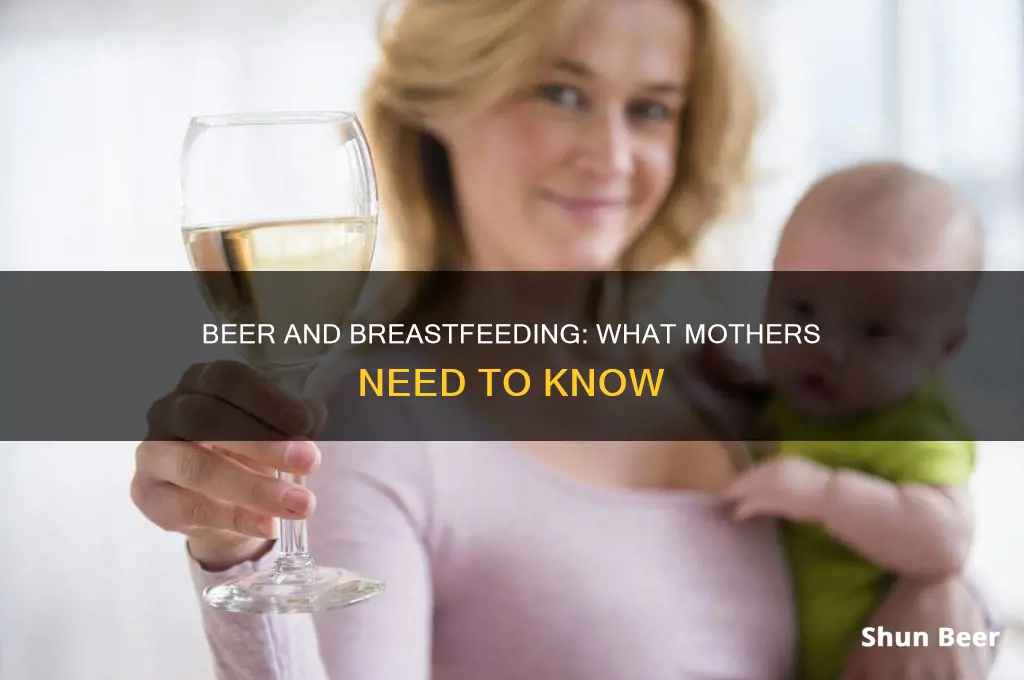
There are many conflicting opinions on whether a breastfeeding mother can drink beer or not. While some sources say that it is safe for a breastfeeding mother to consume alcohol in moderation, others suggest that it is best to avoid it altogether. The American Academy of Pediatrics (AAP) does not recommend drinking alcohol while breastfeeding, and alcohol itself does not increase milk production or help mothers to breastfeed. However, some evidence suggests that the polysaccharide carbohydrates found in beer, such as barley and hops, can increase milk production.
| Characteristics | Values |
|---|---|
| Is it safe for breastfeeding mothers to drink beer? | It is probably safe for breastfeeding mothers to drink beer in moderation. Sources suggest limiting consumption to one drink per day, or two drinks occasionally. |
| How long after drinking beer can a mother breastfeed? | It is recommended to wait at least two hours after drinking beer before breastfeeding. |
| Does drinking beer increase milk production? | While some ingredients in beer are galactagogues, the presence of alcohol suppresses milk production. |
| Does alcohol remain in breast milk? | Alcohol passes freely into breast milk and peaks about 30 to 60 minutes after consumption. It then returns to the bloodstream as the mother's blood alcohol level declines. |
| How long does it take for alcohol to leave the body? | It takes about two to three hours for a 140-pound woman to eliminate the alcohol from one serving of beer or wine. The more alcohol consumed, the longer it takes to eliminate it from the body. |
What You'll Learn

How much alcohol can a breastfeeding mother drink?
It is recommended that breastfeeding mothers avoid drinking alcohol altogether. However, having an occasional drink or drinking in moderation is unlikely to harm your baby. The CDC, for instance, states that drinking a standard size drink (12 oz. of 5% beer) occasionally or on celebratory occasions won't be harmful to the baby.
If you do choose to drink, it is important to wait for at least 2 hours before nursing your baby, as it takes this amount of time for the alcohol to leave your breast milk. The alcohol level in breast milk is essentially the same as the alcohol level in a mother's bloodstream, and it usually takes around 2 to 3 hours for one drink to metabolize out of your bloodstream. The more you drink, the longer it takes for the alcohol to clear your system. For instance, alcohol from 3 drinks can be detected in breast milk for about 6 to 8 hours.
To minimize the amount of alcohol that reaches your baby through breast milk, you can also time your drink for right after you breastfeed. Alternatively, you can pump and store your breast milk before drinking, and then feed your baby with the expressed milk.
It is important to note that drinking alcohol regularly may decrease your breast milk production and affect your baby's sleep patterns. Excessive alcohol consumption can also lead to shortened breastfeeding duration and may cause long-term harm to your baby's development and growth. Therefore, it is generally recommended to avoid drinking alcohol while breastfeeding or to limit your consumption to occasional or celebratory drinks.
Beer Razzles: How Do They Work?
You may want to see also

Does alcohol affect breast milk supply?
While it is commonly believed that drinking beer can help mothers breastfeed, this is not exactly true. Beer does not act as a galactagogue, a chemical that increases milk production. However, there is some evidence that the polysaccharide carbohydrates found in beer, such as barley and hops, can increase milk production.
Research has shown that drinking alcohol regularly may decrease breast milk production and affect how much milk the baby drinks. Alcohol can also disrupt the baby's sleep patterns, causing infant agitation and poor sleep. Nursing after one or two drinks can decrease the infant's milk intake by 20 to 23%.
The American Academy of Pediatrics recommends avoiding alcohol while breastfeeding as alcohol does reach the baby through breast milk. The amount of alcohol transferred is relatively small, but the baby's immature liver means they cannot process and eliminate the alcohol as quickly as an adult.
The effects of alcohol on breast milk production depend on the pattern of drinking. Alcohol decreases milk production, with five drinks or more decreasing the milk ejection reflex and disrupting nursing until maternal alcohol levels decrease. Beer may increase serum prolactin levels during nursing due to the polysaccharides from barley and hops. However, alcohol levels in milk are negligible after the ingestion of non-alcoholic beer.
The highest alcohol levels in milk occur 30 to 60 minutes after drinking an alcoholic beverage, but food delays the time of peak milk alcohol levels. The alcohol in breast milk closely parallels blood alcohol levels. The more alcohol consumed, the longer it takes for the alcohol to clear the body.
It is recommended that breastfeeding mothers limit their alcohol intake to one drink per day or two drinks per occasion. They should also wait at least two hours after drinking before breastfeeding their baby.
Mixing Robitussin and Beer: Is it Safe?
You may want to see also

How long after drinking alcohol can a mother breastfeed?
It is recommended that breastfeeding mothers avoid alcohol consumption, as it can pass into breast milk and may be harmful to the baby. However, having one drink per day has not been found to be harmful to a nursing baby, especially if the mother waits at least two hours between drinking and nursing or pumping. This timeframe is based on the fact that the highest alcohol levels in milk occur 30 to 60 minutes after drinking, and the amount of time it takes for alcohol to leave the body varies from person to person.
The amount of time a mother should wait after drinking alcohol before breastfeeding depends on the number of drinks consumed. The more drinks consumed, the longer it takes for the alcohol to clear the body. Alcohol from one drink can be detected in breast milk for about two to three hours, while alcohol from two drinks can be detected for about four to five hours. It is important to note that newborns metabolize alcohol at about half the rate of adults, and even older babies cannot metabolize alcohol as quickly as adults. Therefore, it is generally recommended to avoid drinking alcohol until the baby is at least eight weeks old.
If a mother chooses to drink alcohol, it is suggested that she breastfeeds her baby immediately before consuming any alcoholic beverages or pumps and saves her milk. This helps ensure that the baby receives very little alcohol. It is also recommended to limit alcohol intake to one or two drinks and to drink juice or eat food while consuming alcohol, as this will slow the rate at which alcohol enters the bloodstream.
It is important to note that drinking alcohol can decrease milk production and affect the milk ejection reflex. Additionally, alcohol can cause sleep, growth, and developmental problems in the baby. Therefore, it is essential to weigh the benefits of breastfeeding against the risks of consuming alcohol.
Drinking Beer at the Park: Is It Legal?
You may want to see also

What are the risks of drinking alcohol while breastfeeding?
While occasional alcohol consumption (1-2 drinks) by a breastfeeding mother does not appear to be harmful to the nursing baby, there are several risks associated with drinking alcohol while breastfeeding.
Firstly, alcohol can cause drowsiness, deep sleep, weakness, and abnormal weight gain in the infant. It can also lead to decreased milk intake by the baby, as it affects the milk ejection reflex in the mother. Research has shown that nursing infants consumed less milk in the three-to-four-hour period after mothers consumed a small to moderate amount of alcohol. This can result in reduced weight gain and impaired immune function in the baby.
Secondly, alcohol consumption by the mother can disrupt the baby's sleep patterns. Studies have found that infants exposed to alcohol in breast milk experienced increased REM sleep and shorter sleep periods, with more frequent wakefulness. This can impact the baby's overall development and cognitive function.
Thirdly, alcohol passes into breast milk and can affect the baby's developing brain. Animal studies have indicated that alcohol may be toxic to the developing brain, particularly during periods of rapid growth in the first year after birth. This could potentially lead to impairments in memory and inhibitory responses in the infant.
Lastly, drinking alcohol while breastfeeding can also impact the mother's natural reflexes, such as the milk ejection reflex, and increase the risk of sudden infant death syndrome (SIDS) if bed-sharing is practised.
Therefore, it is generally recommended that breastfeeding mothers avoid alcohol consumption or limit it to occasional intake, with a maximum of one drink per day. It is also advised to wait for at least two hours after drinking before breastfeeding or pumping, as that is when the alcohol level in breast milk is typically highest.
Beer Drinking in California Public Parks: What's Allowed?
You may want to see also

Does drinking alcohol affect the baby's sleep?
While it is recommended that breastfeeding mothers avoid drinking alcohol, some sources state that drinking very moderately (one drink a day) is unlikely to be harmful to a nursing baby, as long as the mother waits at least two hours between drinking and nursing or pumping. However, drinking alcohol can affect a baby's sleep patterns, even after a small to moderate amount of alcohol.
Research has shown that breastfed infants experience significantly less active sleep after exposure to alcohol in their mother's milk. This reduction in active sleep was observed in most infants tested in a study, and the decrease was particularly notable during the hours immediately after exposure. Although the infants then compensated for this reduction in the following 20.5 hours, when their mothers refrained from drinking alcohol, the findings indicate that acute exposure to alcohol in mothers' milk produces distinctive changes in the infants' sleep-wake patterns.
Furthermore, alcohol can disrupt the natural sleep cycle, and this effect may be even more pronounced in babies. While alcohol may help adults fall asleep faster, it can also cause them to wake up in the middle of the night. In babies, even a few drops of alcohol might cause them to become sick, throw up, or even lead to death. Therefore, it is best to avoid giving any alcohol to babies and to wait at least two hours after drinking before breastfeeding or pumping.
Beer and Pregnancy: Is It Safe for Expectant Mothers?
You may want to see also
Frequently asked questions
Yes, a breastfeeding mother can drink beer, but it is advised to consume no more than one drink a day.
It is recommended to wait for at least two hours after drinking beer before breastfeeding.
Drinking beer can decrease the amount of milk consumed by the baby and cause sleep disturbances, decreased weight gain, impaired immune function, and delayed motor development.
There is some evidence that the ingredients in beer, such as barley and hops, can increase milk production, but the presence of alcohol may counteract these benefits by suppressing milk production.







